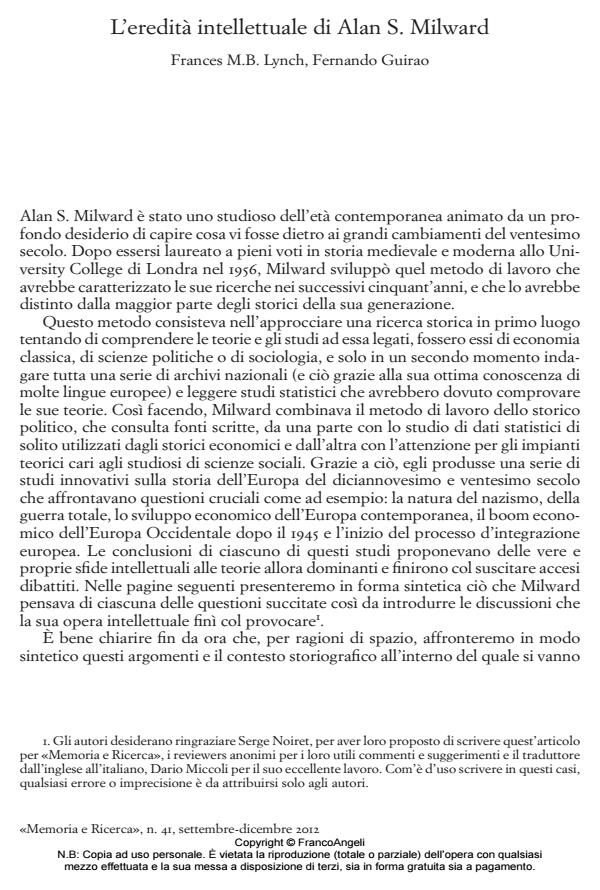L’eredità intellettuale di Alan S. Milward
Titolo Rivista MEMORIA E RICERCA
Autori/Curatori Frances M.B. Lynch, Fernando Guirao
Anno di pubblicazione 2013 Fascicolo 2012/41 Lingua Italiano
Numero pagine 26 P. 181-206 Dimensione file 152 KB
DOI 10.3280/MER2012-041011
Il DOI è il codice a barre della proprietà intellettuale: per saperne di più
clicca qui
Qui sotto puoi vedere in anteprima la prima pagina di questo articolo.
Se questo articolo ti interessa, lo puoi acquistare (e scaricare in formato pdf) seguendo le facili indicazioni per acquistare il download credit. Acquista Download Credits per scaricare questo Articolo in formato PDF

FrancoAngeli è membro della Publishers International Linking Association, Inc (PILA)associazione indipendente e non profit per facilitare (attraverso i servizi tecnologici implementati da CrossRef.org) l’accesso degli studiosi ai contenuti digitali nelle pubblicazioni professionali e scientifiche
Alan S. Milward was a contemporary historian who combined the political historian’s method of consulting the written record with the economic historian’s use of statistical data and the social scientist’s preference for general theory. On the strength of the resulting research methodology he produced a series of original histories of Nineteenth and Twentieth century Europe which tackled the big historical issues of his time: the nature of Nazism; of total war; of economic development in Nineteenth and Twentieth century Europe; and the reasons for the sustained economic boom in western Europe after 1945 and for the origins of European integration. In so far as his conclusions on each separate theme challenged the dominant theories, they stimulated considerable debate. Indeed, his implicit theories of historical change and European integration continue to resonate in the current political and economic crises facing Europe. Unlike neo-classical economists, European federalists and many integration theorists, Milward argued that economic and monetary union would not necessarily lead to a democratic political union in Europe and the end of nation-state. Indeed he predicted in 2000 that if the European Monetary Union was beset by asymmetric shocks, it would weaken progressively until its desired effect had been so reduced as to defeat the Union’s original purpose. As we live through such asymmetric shocks, Milward’s predictions seem to carry more force than any of teleological theories of European integration.;
Keywords:Alan S. Milward, Economic growth, European integration, Nazi Germany, Second World War, War economy
Frances M.B. Lynch, Fernando Guirao, L’eredità intellettuale di Alan S. Milward in "MEMORIA E RICERCA " 41/2012, pp 181-206, DOI: 10.3280/MER2012-041011